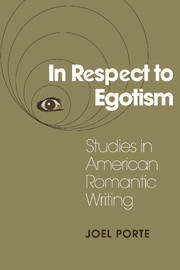Book contents
- Frontmatter
- Contents
- Preface
- Acknowledgments
- In Respect to Egotism
- Introduction: Writing, Reading, Romanticism
- 1 “Where … Is This Singular Career to Terminate?”: Bewildered Pilgrims in Early American Fiction
- 2 “Where There Is No Vision, the People Perish.…”: Prophets and Pariahs in the Forest of the New World
- 3 Poe: Romantic Center, Critical Margin
- 4 Emerson: Experiments in Self-Creation
- 5 Hawthorne: “The Obscurest Man of Letters in America”
- 6 Thoreau's Self-Perpetuating Artifacts
- 7 Melville: Romantic Cock-and-Bull; or, The Great Art of Telling the Truth
- 8 Douglass and Stowe: Scriptures of the Redeemed Self
- 9 Whitman: “Take Me as I Am or Not at All.…”
- Interchapter: Walt and Emily
- 10 Dickinson's “Celestial Vail”: Snowbound in Self-Consciousness
- Notes
- Index
- CAMBRIDGE STUDIES IN AMERICAN LITERATURE AND CULTURE
Introduction: Writing, Reading, Romanticism
Published online by Cambridge University Press: 24 March 2010
- Frontmatter
- Contents
- Preface
- Acknowledgments
- In Respect to Egotism
- Introduction: Writing, Reading, Romanticism
- 1 “Where … Is This Singular Career to Terminate?”: Bewildered Pilgrims in Early American Fiction
- 2 “Where There Is No Vision, the People Perish.…”: Prophets and Pariahs in the Forest of the New World
- 3 Poe: Romantic Center, Critical Margin
- 4 Emerson: Experiments in Self-Creation
- 5 Hawthorne: “The Obscurest Man of Letters in America”
- 6 Thoreau's Self-Perpetuating Artifacts
- 7 Melville: Romantic Cock-and-Bull; or, The Great Art of Telling the Truth
- 8 Douglass and Stowe: Scriptures of the Redeemed Self
- 9 Whitman: “Take Me as I Am or Not at All.…”
- Interchapter: Walt and Emily
- 10 Dickinson's “Celestial Vail”: Snowbound in Self-Consciousness
- Notes
- Index
- CAMBRIDGE STUDIES IN AMERICAN LITERATURE AND CULTURE
Summary
The question of “the text” has come increasingly to the center of attention in recent years and accordingly deserves some scrutiny here at the outset. In both their historical and technical aspects the major texts of the American literary tradition have come to be seen as somewhat problematic. In the first place, questions have quite properly been raised about the reliability of texts transmitted to us typically in surprisingly haphazard fashion. Quite literally, we have discovered that we did not know what we were reading – whether, for example, variations from edition to edition or from manuscript to first printing in periodicals or in pamphlet form and on to first book edition, could be ascribed to the author, to friends, relatives, or literary executors, or indeed to publishers and printers. In some cases manuscripts no longer exist or have not been found, and the same is true for galley and page proofs. Naturally, the problems vary from author to author.
James Fenimore Cooper, for example, was long considered a careless author who composed quickly and never bothered to revise, but recent textual scholarship suggests that this is not true. Poe's literary estate was left, after his bizarre and premature death, in the hands of a malicious “executor” (Rufus Griswold) who altered some things to suit his own devious ends. Several of Emerson's most important pieces – “The American Scholar” and the Divinity School Address, in particular – were delivered orally only once for a specific audience from scripts that no longer exist.
- Type
- Chapter
- Information
- In Respect to EgotismStudies in American Romantic Writing, pp. 1 - 30Publisher: Cambridge University PressPrint publication year: 1991

